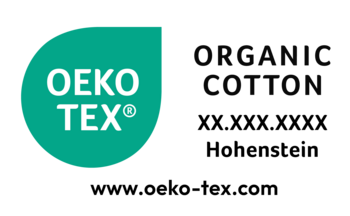Genetically modified cotton
More and more consumers prefer sustainable textiles, especially the demand for products made from organic cotton is growing rapidly. Compared to conventionally grown cotton, the cultivation of organic cotton requires the absence of genetically modified seeds, chemical pesticides and fertilisers. Nevertheless, genetic modifications are repeatedly found in textiles that are falsely labelled with the relevant organic labels. However, the usually higher market price for organic cotton is only justified if independent proof of the organic cultivation of the raw material is credibly provided.
We ensure that you are on the safe side with your products by testing them for genetic modification. Hohenstein is one of only a few testing laboratories worldwide that is accredited to ISO/IEC 17025 for the ISO/IWA 32:2019 protocol. This means that we can reliably provide you with evidence of genetically unmodified cotton, e.g. for certification of the international Global Organic Textile Standard (GOTS).
100% certainty in 2 steps
GMO screening according to ISO/IWA 32:2019 protocol
As one of only a few testing laboratories worldwide, we are accredited according to ISO/IEC 17025 for the ISO/IWA 32:2019 protocol. We can therefore also meet the strict requirements regarding a GMO verification of the international Global Organic Textile Standard (GOTS). For this, it is mandatory to perform the testing on raw cotton or chemically untreated yarns and textile surfaces.
The GMO screening leads to a clear yes/no statement about the presence of genetically modified cotton in the tested sample.
- The sample is shredded and the cotton fibres are digested mechanically and enzymatically. The genetic material (DNA) is isolated from the fibres and purified in a multi-stage process.
- A genetic modification is present if specific target sequences (marker genes) are present in the DNA. These can be detected by molecular biology. Control reactions are used to detect unmodified cotton DNA and to exclude false-negative results.
As a rule, the DNA is protected in the cell nucleus of the cotton fibre. In rare cases, DNA analysis does not work. For example, if the cotton has been so heavily stressed within the processing procedures that the cotton DNA in the cell nucleus has been damaged or destroyed. In this case, we recommend taking samples from previous process stages or testing the raw material directly.
GMO quantification
Based on a positive GMO screening according to ISO/IWA 32:2019 protocol, we are one of the first testing laboratories in the world to be able to identify cotton lines for which genetic modifications are known and quantify their respective proportion in the sample (raw cotton).
This identification of individual genetic modifications and their quantification allows an assessment of whether this is an extremely minor blending due to contamination or whether there is an admixture of larger proportions of genetically modified cotton. This is a clear advantage for manufacturers, brands and retailers in terms of supply chain transparency and fraud management.
Upon customer request, after a positive GMO screening, further DNA analysis is used to specifically search for different cotton lines with known genetic modifications, and we quantify the respective proportion within the sample.
Your benefits.
- Quality control
- Product identification
- Fraud management
- Supply chain transparency

